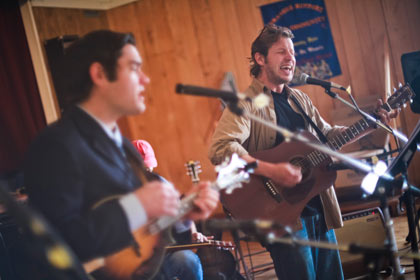Saturday, Nov. 3, at the Axe and Fiddle was an event 40 years in the making. Hundreds of people filled the pub, occupying every table, lining the staircase overlooking the stage and some even finding spots on the wood floor. Hundreds of faces basked in the glow of flickering tea lights gaze upon the stage as a soft voice filled the cavernous space. Wayne Drury, squeezing his blue eyes shut, leans forward in his wheelchair to the mic as he sings “Cimarron Rose” over the strumming of his former band mates, Rob Anderson on guitar and Randy Crawford on banjo. It is the first time the three men, members of the alt-country band Jackdaw, have been together in the same room since 1972, let alone shared a stage. The last wisps of the outlaw tune leave Drury’s lips and the crowd jumps to their feet in a raucous standing ovation. A woman in the crowd cries out, “Bob Dylan’s got nothing on you,” over the hooting and hollering. This is the Wayne Drury Project and Wayne Drury is the folk hero you have never heard of.
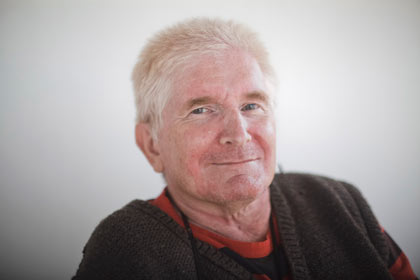 |
| Wayne Drury |
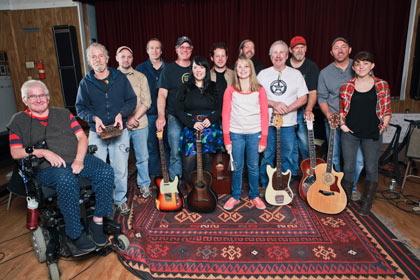 |
| The Wayne Drury Project |
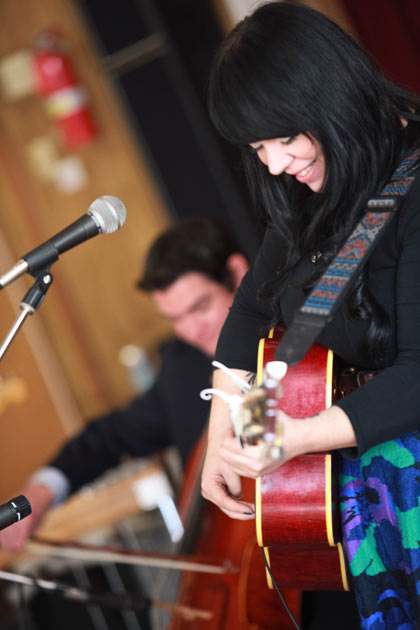 |
| Tara Stonecipher |
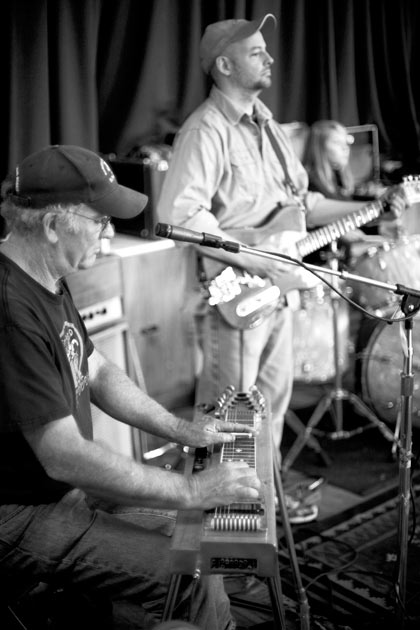 |
| Gregg Vollstedt, Steve Holst |
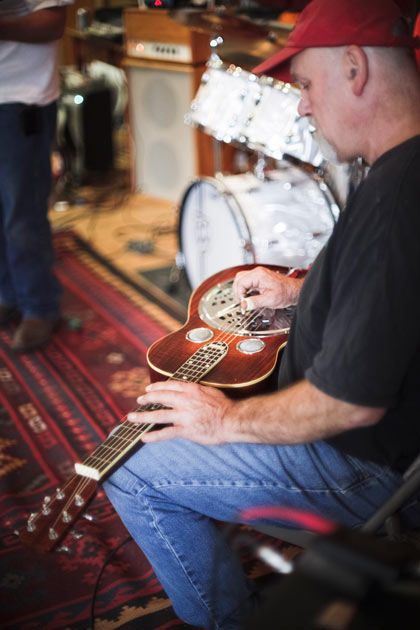 |
| Billy Storms |
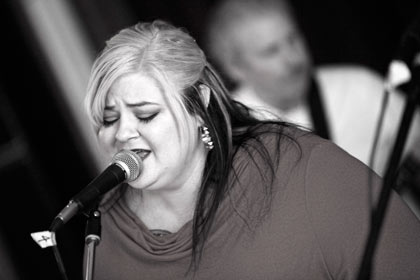 |
| Sara Scofield |
The Wayne Drury Project is not a band, nor is it just an event; it is a full-blown modern-day folk song revival. Nov. 3 was one of a series of shows that the collaboration of musicians known as the Wayne Drury Project will perform in order to save the nearly-forgotten music of Drury, an alt-country musician before there were alt-country musicians, who, after being diagnosed with multiple sclerosis in the ’70s, followed later by a stroke and the removal of a kidney, has struggled to keep playing the private folk canon he created. The canon is filled with catchy and haunting melodies guided by Drury’s silvery Neil Diamond-esque voice, and peppered with plenty of twang, folk and rock ‘n’ roll to nest it firmly in the now-recognized genre. Local musician Gregg Vollstedt (lap steel guitar and vocals for Whopner County Country All-Stars, lap steel guitar for The Whiskey Chasers), who has been greatly influenced by Drury’s music, has spent the last year herding musicians from around the country (the count at press time was 19) and running practices for a project that culminates with a show Nov. 10 at the WOW Hall — the old stomping grounds of Drury and Jackdaw. The story of the Project doesn’t begin in Eugene; it unfolds somewhere in between London and New York City and Oregon across a span of 65 years.
Last Cowboy in Paris
Around the turn of the millennium, Rob Anderson was stumbling around his flat’s attic in London when he came across some old Jackdaw LPs — the LPs that he and Drury had recorded over 30 years ago when they snuck into Raspberry Records at the former Oakway Mall (now Oakway Center). Anderson knew the sound engineer who agreed to let them in one night (without the owner’s knowledge) and record in the 16-track studio, where they laid down the tracks “Cimarron Rose,” “Gas Station Girl,” “New York Central Line,” “Separate Ways,” “Country Song” and “Step Right Over.” He listened to the LPs and an idea struck him — he had to revive the music. Anderson only had infrequent contact with Drury since hopping the Atlantic in 1989, first to Paris and then to London. Drury had visited Anderson once in Paris, after which he wrote the song “Last Cowboy in Paris” about his friend.
“I contacted Wayne and asked if anything had happened with the songs. Wayne said nothing had been done,” says Anderson, over the phone from London. In the three decades that had passed since that night at Raspberry Records, Drury had been diagnosed with MS, followed by a stroke, which made both speaking and holding a guitar problematic. “I realized if I didn’t do something with them, they would just evaporate.”
Anderson got to work and rallied his own group of musicians, including English folk music legend Wizz Jones and the Spokane-based folk singer-songwriter Laddie Ray Melvin (who flew to London from Washington for the project), none of whom knew or knew of Drury, to shake the cobwebs from his tunes and perform them at heritage folk venues like The Troubadour, Wizz’s Sitting Room and The Ivy House. “It was just magical the way it happened,” he says. “It was driven completely by the belief that the songs were worth saving.” Each gig they played had a larger audience as word got out around old London Town. “Everyone that came responded incredibly to the music, a number of people that came up afterwards were in tears,” Anderson says.
Before long Vollstedt, who went to see Jackdaw perform as a teenager and later would join the band Chicory with Anderson, caught wind of the London-based project and decided that something needed to be done closer to Eugene, closer to Drury.
Country Song
“Alt-country?” Drury says, sitting upright in his bed at the Coast Fork Nursing Center in Cottage Grove. “What the hell is that?” Vollstedt and the project’s public relations representative, Kaitlin Anderson, sit in folding chairs on either side of the bed, laughing. A collage of the past and present — patinaed photos of Jackdaw, a picture of his former cat, a ukulele and a bumper sticker that says “Make Tea, Not War” — hang on the wall behind Drury’s head.
“You invented alt-country,” says Vollstedt, smiling. “They didn’t have that term back in the old days. I think it came about because of people like you.” Drury laughs and snorts, shaking his head.
“I’m serious,” says Vollstedt. “Because at the time, the term didn’t exist. There was country, there was rock, there was rhythm and blues, there was blues and there was folk and it was pretty compartmentalized. And then groups like The Byrds came along and they took folk music and electrified it. So then they had to come up with a term so they came up with folk rock … Then as things went on a little further it wasn’t really rock ‘n’ roll but it wasn’t country like Hank Williams. At that time country was pretty strictly defined … Country was Nashville and so then they came up with this term ‘alt-country,’ which if they had had that term while Wayne was writing songs they probably would have said, this is alt-country, but they didn’t have that term because Wayne was busy inventing it.”
Gas Station Girl
Drury’s musical journey begins in White Plains, N.Y., where he was born in 1947. His mother bought him a harmony ukulele and a Mel Bay chord book when he was five after noticing his enthusiasm for ’50s TV personality and ukulele player Arthur Godfrey. By the time he was nine, Drury had saved up enough money ($29) to buy his first guitar.
“It was called the Carmencita,” Drury says, his cool blue eyes twinkling behind black frames and his once long, corn-silk mane buzzed closely to his head. By the time he was old enough to legally drink, Drury had been “asked to leave” Syracuse University, where he was studying painting and sculpture, because he “didn’t have the money.” He moved with friends into an apartment in the city, five blocks away from rock ‘n’ roll pantheon, the Fillmore East. By day he worked Brentano’s (the same bookstore where Patti Smith worked), and by night he walked to the Fillmore.
“For five bucks I could see Ten Years After, Canned Heat, Janis Joplin, Chuck Berry, The Who, Cream,” Drury says. One afternoon in the dog days of summer, Drury was sitting in his apartment with roommates. “It was hot as hell. My apartment was four floors up. We were sitting around saying ‘It’s hot, let’s get out of this city.’ One friend says, ‘I’ve been to Eugene, Oregon. It’s real nice there.’”
By 1969, Drury had arrived in Eugene after hitching north from L.A. He had done a drive-away from New York to L.A. in a ’65 Bonneville convertible with four friends and his cat, Mona. Drury quickly settled into the Odyssey Coffee House as a regular, becoming another member of the counterculture, bohemian family.
“Not the Jack Kerouac kind of bohemian,” says Cynthia Wooten, co-owner of the Odyssey with her late husband Bill. “It was the dawn of a new culture and new politics and a new way of being.” The Odyssey was not only the center of Eugene’s counterculture movement, it was the center of Jackdaw’s musical universe at the time — it’s where Drury, Anderson and Crawford met, performed, hung out and worked. It’s also where Vollstedt, accompanied by his teenage buddies, came to watch Jackdaw and rubbed shoulders with university students, hippies, wanderers, Rolling Stone freelancers and the Merry Pranksters in a cloud of cigarette smoke and coffee steam. Wooten even commissioned the artistically-inclined Drury to create the first poster for the Oregon Country Fair (then known as the Renaissance Faire) and several more after that, and he also could be found washing dishes between sets. Wooten remembers Drury as soft-spoken and extremely bright. “His view of the world is just fascinating. He’s cryptic and I wouldn’t say cynical, but questioning all the time, but with this enormous heart,” she says.
Before long, Wooten recognized the burgeoning music scene and helped start the Farmer’s Almanac On the Air, an open mic that broadcast from the Odyssey live every Sunday night. Drury, Anderson and Randy Crawford frequently played the live show. “Everybody loved them,” Wooten says. “I don’t know why none of us had the skills or whatever to figure out a way to promote them, get them agents, create a broader audience for them, but anyway, that didn’t happen at the time.”
It was about this time that Drury wrote his first song at his house on Ferry Street. Drury could not stop thinking about a woman he’d briefly met while driving cross-country — she served him sandwiches at a turnpike restaurant in Colorado. Strumming a Gibson guitar in his tiled bathroom (because the acoustics “killed”), Drury wrote “Gas Station Girl,” which soon became one of their signature songs, covered by local bands like Wheatfield and broadcasted by local radio stations. After that, the songs came “fast and furious” and soon he had written “New York Central Line,” “Cimarron Rose,” “Country Song,” “New York Phoenix” and more too numerous to list here.
“Wayne wrote the music,” Anderson says. “He would show up in the afternoon and he would have a new song … It was kind of like the sun coming up, ‘Oh here’s Wayne with a new song.’ To me, it seemed effortless to Wayne.”
Anderson, who has called Drury the most creative person he’s ever met, says Jackdaw was together for only “a few intense years” before the members parted ways for myriad reasons: marriage, moving away, the closure of the Odyssey in 1972 because of an urban renewal project and health reasons. At this point, Drury already had a catalogue of songs, mostly unrecorded, but by the mid-’70s, Drury was having bouts of numbness and paralysis due to MS. Managing the autoimmune disease through medical supervision, diet, swimming and cycling, Drury continued to walk, bike and write music until 2009 when he had a kidney removed.
“My kidney died and I couldn’t play anymore. I went to the hospital and they took it out and that’s that,’ says Drury, sitting in his wheelchair under a tree in the nursing center’s parking lot. But Drury could not stand the thought of remaining a passive audience member while watching the Wayne Drury Project perform his music and thus, he too practiced for the preceding months despite many obstacles like lack of privacy (he shares a room at the center) and learning to sing again. He also often sat in on the practices held by the Project, offering feedback about the cadence or speed of songs that were only hand-written remnants.
New York Phoenix
“I used to listen to Wayne. I got involved because it’s important for musicians to be able to recognize how important it is that all the music they listened to influenced them. We all give tribute to people like Louis Armstrong. So why aren’t we giving tribute to the local scene? Where does it come into play?” asks Billy Storms, a Project member who plays lap steel guitar for “Gas Station Girl,” “Anna Lee,” “Cimarron Rose” and several others. The Project is taking a break from practice on a sunny October afternoon. Like Vollstedt, Storms remembers the songs that he first heard as a teenager, and what struck him about them.
“The words, the lyrics, the melody — It’s all of what encompasses a song. He’s telling a story, like ‘Gas Station Girl,’ it doesn’t take long to figure out he’s hot on this girl and goddamnit she pumps gasoline,” he says, laughing. “It’s exciting.”
Local physician and musician Bill Moshofsky, who does harmony vocals and keyboard on “Separate Ways” and “Coyote,” agrees. (His daughter Laura Moshofsky, also involved in the Project, sings heartbreaking lead vocals on “Cimarron Rose.”) “It’s the way it’s put together, the chord progressions … the newness of the music,” Moshofsky says. “Even if it wasn’t in the project itself, it’s music I found myself singing throughout the day because the tunes just have a quality to them. It could be a resurgence because of the music. I was, in fact, daydreaming. I was thinking, you know, someone would pick it up. They would go ‘Wow, this is really good. This is something interesting.’”
For Whopner County Country All-Stars lead vocalist Sara Scofield, who does a powerhouse performance of the melancholy “Anna Lee,” the experience goes even further than the music, it’s about the people. “It feels better than playing for people who are dead. Honestly, I appreciate that I can sing this and see Wayne there and see his reaction,” Scofield says, laughing. “To take it one step furthur than that, we were able to sing with Wayne. It’s amazing to sing with someone who wrote the song … to say I honor you as a person.”
Scofield, the Project and audiences will have one more chance to do that at the upcoming Nov. 10 WOW Hall show. And if the Axe and Fiddle show is any indicator, it will be a full house. But perhaps, this won’t be the last of the Wayne Drury Project. Gung-Ho Studios are recording the live shows and Vollstedt and Co. are adamant to keep the music alive, perhaps even making it an annual event in Eugene, London and anywhere else there are Wayne Drury fans.
“This has been the best thing I’ve done or as Randy Crawford puts it, ‘This will be one of the great events of this life,’” Vollstedt says.
The Wayne Drury Project play 8 pm Saturday, Nov. 10, at WOW Hall; $7 adv, $10 door.
